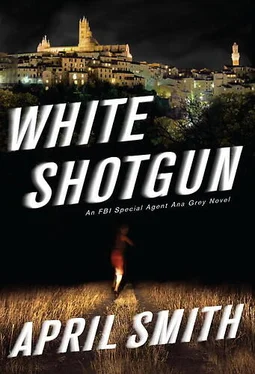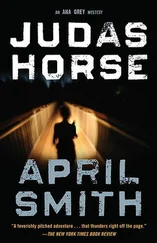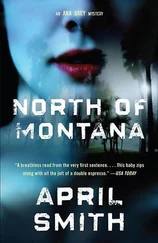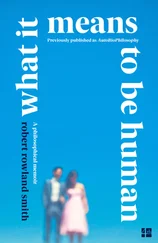April Smith - White Shotgun
Здесь есть возможность читать онлайн «April Smith - White Shotgun» весь текст электронной книги совершенно бесплатно (целиком полную версию без сокращений). В некоторых случаях можно слушать аудио, скачать через торрент в формате fb2 и присутствует краткое содержание. Год выпуска: 2011, ISBN: 2011, Жанр: Триллер, на английском языке. Описание произведения, (предисловие) а так же отзывы посетителей доступны на портале библиотеки ЛибКат.
- Название:White Shotgun
- Автор:
- Жанр:
- Год:2011
- ISBN:978-0-307-59679-6
- Рейтинг книги:4 / 5. Голосов: 1
-
Избранное:Добавить в избранное
- Отзывы:
-
Ваша оценка:
- 80
- 1
- 2
- 3
- 4
- 5
White Shotgun: краткое содержание, описание и аннотация
Предлагаем к чтению аннотацию, описание, краткое содержание или предисловие (зависит от того, что написал сам автор книги «White Shotgun»). Если вы не нашли необходимую информацию о книге — напишите в комментариях, мы постараемся отыскать её.
White Shotgun — читать онлайн бесплатно полную книгу (весь текст) целиком
Ниже представлен текст книги, разбитый по страницам. Система сохранения места последней прочитанной страницы, позволяет с удобством читать онлайн бесплатно книгу «White Shotgun», без необходимости каждый раз заново искать на чём Вы остановились. Поставьте закладку, и сможете в любой момент перейти на страницу, на которой закончили чтение.
Интервал:
Закладка:
“I’m between addresses now,” I say.
“What work do you do?”
“I’m in security,” I reply, with what I hope looks like a sincere smile.
“I’m sorry — do you mean banking?” “Protecting banks. Alarm systems.” His eyebrows rise. “ Interessante. I would have thought fashion.” Involuntarily I look down at the brown dress. “Really?” “Of course, bella! You know, you look just like your sister? Both of you are intelligent and lovely women. I adore her. And now I have the pleasure of knowing you!” Sofri releases the pressure on my hand with a sigh of satisfaction, and I feel that I have met my prince — never mind that he is fifty years older than I am, and that I’m in love with Sterling. His courtliness makes me feel special. The other half of the equation, of course, is my appreciation of his masculine ability to charm. I am thrilled by the novelty of what promises to be an old-fashioned, chivalrous relationship; without the need to conquer, we are free to become great friends.
At one point, behind our wineglasses, we find ourselves watching Cecilia, who is standing alone in the smashing black dress and listening in dismay to a message on her cell phone.
“She looks worried,” I say. “She hasn’t heard from Giovanni.” “I know. I told her it is to be expected.” “Isn’t it kind of a slap in the face to his parents not to show up?” “Normally yes, but not during Palio.” “Because Giovanni’s out partying?” “Fighting.”
“Fighting! For what? Defending the antipasti?” Waiters have appeared with fried artichokes, marinated mushrooms, dried beef drizzled with olive oil, cured mussels, mozzarella and tomato and basil, plates stacked all the way up their arms.
“Each contrada has a blood rival. Our enemy is Torre, the Tower. If a young man enters the zone between Torre and Oca, it means a fight. Love for one’s contrada is equal only to hatred for one’s enemy,” he says passionately. “You will find guests from different contrade here tonight, but never from Torre. Never.” Sofri removes the silk square from his breast pocket and pats the moisture at his temples. You have to love this guy. He takes everything seriously.
“Calm down, Sofri. It’s only dinner.” We move toward our table, where six or eight well-dressed people gaily introduce themselves in an incomprehensible chatter of Italian. The mood is buoyant as the food is served. After the primi course of homemade ravioli stuffed with the porcini mushrooms we bought that morning, Sofri jumps up to pour more wine. “A big red,” he explains grandly, “to accompany my latest recipe — ròtolo di coniglio al caffè, rabbit rolled with coffee!” Waiters are fanning out with plates of browned meat on skewers when I notice a figure crossing from the blackness beyond the ruin walls into the lights of the party. She is purposeful but respectful; a police detective wearing a skintight blue-skirted uniform, a white gun belt, and low heels. She taps the hostess on the shoulder. Obviously, they know each other. Cecilia looks up with recognition and joy, but the detective has her cop face on.
Sofri reacts immediately.
“Stay,” he says. “This is not a problem,” absurdly denying the presence of red lights pulsing on a cruiser parked nearby, and the grim policewoman. The guests are either in on the game or too absorbed to pay attention. My guess is they know the code: Pretend to ignore this.
Sofri excuses himself and joins Nicosa and Cecilia at a serving station. The detective is holding Cecilia’s hand. Cecilia breaks away for a brief hug from Sofri. After some conversation Nicosa, Cecilia, and the detective leave together, and Sofri returns to the table.
“What is going on?”
“There has been an accident.”
“Giovanni?”
Sofri picks up his napkin. “He will be fine,” he says.
EIGHT
Along the Via Salicotto the flags of Torre were still, their colors of brilliant burgundy and blue at rest in the night like folded wings of mythological beasts.
Giovanni was found in an anonymous tunnel that turns off the main street and opens into one of a thousand tiny courtyards in the medieval part of the city, where buildings meet at random angles. The arched passageway of chalky brick is primitive, just high enough for a man seated on a wagon to pass underneath. By day it is as dark as an Etruscan tomb. By night it is lit by one fluorescent fixture. A street cleaner discovered the boy half dead in the fluttering light, in the heart of enemy territory.
If Torre was out for blood, they got it. His stab wounds made a trail of blood down the sloping pavers. We might have been able to recover footprint evidence from the attackers if the street cleaner hadn’t sprayed the ground with water before — or possibly after — discovering the victim. The street cleaner’s contrada affiliation was unknown; by then I knew enough about the cultural weirdness of Siena that it was the first question I asked.
The course the investigation should take sped through my mind — seal the crime scene, canvass the neighborhood, interview witnesses. I was impatient to talk to the first responders. They had taken my nephew to Ospedale Santa Caterina, twenty kilometers north of the city, because it is one of Cecilia’s private clinics with a higher standard of care — a questionable decision that cost time. He was almost gone from loss of blood. A knife to the chest had collapsed a lung. Breathing must have been agony.
The priest of the Oratorio di Santa Caterina, the church of the Oca district, had been a guest at the party. In his forties, with thick black hair and gold-rimmed glasses, he wore the green and white scarf with the Goose over his cassock. He spoke at a gentle pace, a person of true contemplation — none of the greedy egotism I expected in a religious leader. As a hostess, Cecilia treated him with utmost respect, showing all her sides — competent, obedient, and seductive — deeply desiring to impress herself upon the quiet authority of this man.
So when Sofri and I saw that the priest had also gotten up from his table and was hurrying behind Cecilia and Nicosa to the red Ferrari, we left the party immediately, and drove thirty-five minutes on hair-raising jet-black roads to the hospital, which was located in an industrial park. Like my sister, it wasn’t large, but inspired confidence. It had the air of bold, forward-thinking modernity, with a waiting area like an upbeat take on a sixties motel — turquoise sofas and funky lamps like daisies that looked surreal in contrast to the torchlit grandeur of the abbey, and the life-and-death struggle of a kid who was into something way over his head.
When we arrive, the waiting area is empty. Sofri disappears down a hallway to locate the family while I attempt to engage the one police officer in sight — overweight, middle-aged, with a big, bald, indented head. His front teeth are yellow and pushed together as if he’d been attacked by a mad dentist with a vise. When I ask for information about Giovanni Nicosa, he shrugs as if he has never heard the name. I try again, explaining that I am the boy’s aunt from California, and I am very worried.
“California?” He understands “California” and slowly grins with recognition.
“TV?” says the officer.
“You watch TV?”
He nods.
“American TV?”
“Sì.”
“Really? What is your favorite TV show?” He draws in the air. Tracing letters.
“ CSI! You like CSI?” He nods, pleased to have conveyed this important fact.
Once again, Sofri arrives to save the day. At his side is the woman police detective who appeared at the abbey, Inspector Francesca Martini, talking rapidly on a cell phone while clutching three unopened packs of cigarettes. Still talking, Inspector Martini manages to shake my hand.
Читать дальшеИнтервал:
Закладка:
Похожие книги на «White Shotgun»
Представляем Вашему вниманию похожие книги на «White Shotgun» списком для выбора. Мы отобрали схожую по названию и смыслу литературу в надежде предоставить читателям больше вариантов отыскать новые, интересные, ещё непрочитанные произведения.
Обсуждение, отзывы о книге «White Shotgun» и просто собственные мнения читателей. Оставьте ваши комментарии, напишите, что Вы думаете о произведении, его смысле или главных героях. Укажите что конкретно понравилось, а что нет, и почему Вы так считаете.












